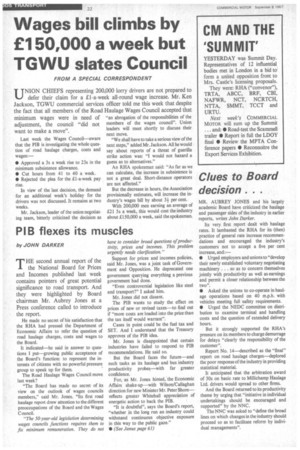Wages bill climbs by £150,000 a week but TGWU slates Council
Page 24

If you've noticed an error in this article please click here to report it so we can fix it.
FROM A SPECIAL CORRESPONDENT
UNION CHIEFS representing 200,000 lorry drivers are not prepared to defer their claim for a f1-a-week all-round wage increase. Mr. Ken Jackson, TGWU commercial services officer told me this week that despite the fact that all members of the Road Haulage Wages Council accepted that
minimum wages were in need of adjustment, the council "did not want to make a move".
Last week the Wages Council—aware that the PIB is investigating the whole question of road haulage charges, costs and wages:— • Approved a 3s a week rise to 23s in the minimum subsistence allowance.
• Cut hours from 41 to 40 a week.
• Rejected the plea for the £1-a-week pay rise.
In view of the last decision, the demand for an additional week's holiday for the drivers was not discussed. It remains at two weeks.
Mr. Jackson, leader of the union negotiating team, bitterly criticized the decision as "an abrogation of the responsibilities of the members of the wages council". Union leaders will meet shortly to discuss their next move.
"We shall have to take a serious view of the next steps," added Mr. Jackson. All he would say about reports of a threat of guerilla strike action was: "I would not hazard a guess as to alternatives."
An RHA spokesman said: "As far as we can calculate, the increase in subsistence is not a great deal. Short-distance operators are not affected."
But the decrease in hours, the Association provisionally estimates, will increase the industry's wages bill by about 34per cent.
With 200,000 men earning an average of £21 5s a week, this would cost the industry about £150,000 a week, said the spokesman.




















































































































